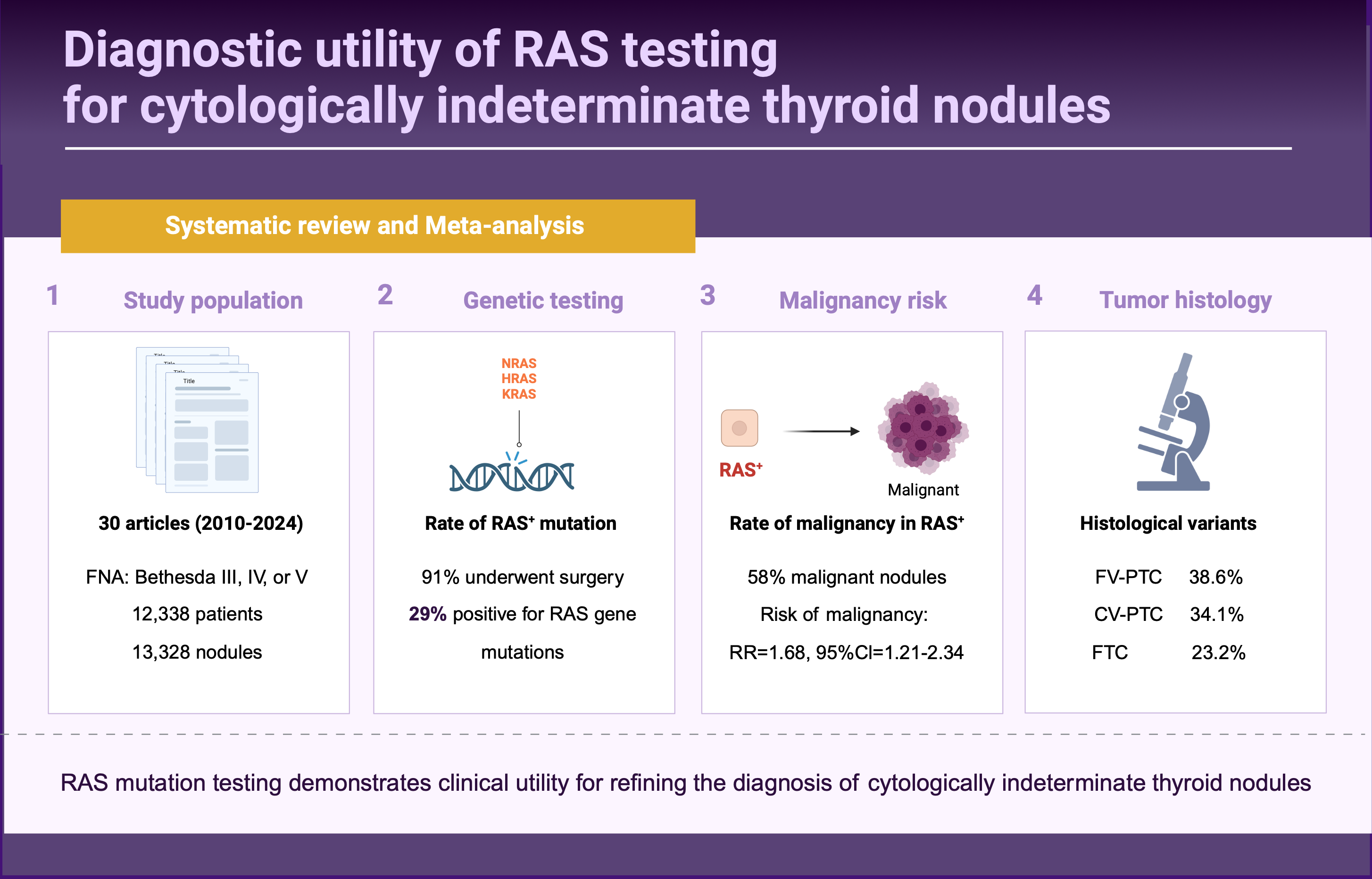Diagnostic utility of RAS mutation testing for refining cytologically indeterminate thyroid nodules
DOI:
https://doi.org/10.17179/excli2024-6975Keywords:
genomic mutations, indeterminate thyroid nodules, fine needle aspiration cytology, thyroid carcinoma, diagnostic accuracy, personalized medicineAbstract
RAS mutations are prevalent in indeterminate thyroid nodules, but their association with malignancy risk and utility for diagnosis remains unclear. We performed a systematic review and meta-analysis to establish the clinical value of RAS mutation testing for cytologically indeterminate thyroid nodules. PubMed and Embase were systematically searched for relevant studies. Thirty studies comprising 13,328 nodules met the inclusion criteria. Random effects meta-analysis synthesized pooled estimates of RAS mutation rates, risk of malignancy with RAS positivity, and histologic subtype outcomes. The pooled mutation rate was 31 % (95 % CI 19-44 %) among 5,307 indeterminate nodules. NRAS mutations predominated at 67 % compared to HRAS (24 %) and KRAS (12 %). The malignancy rate with RAS mutations was 58 % (95 %CI=48-68 %). RAS positivity increased malignancy risk 1.7-fold (RR 1.68, 95 %CI=1.21-2.34, p=0.002), with significant between-study heterogeneity (I2=89 %). Excluding one outlier study increased the relative risk to 1.75 (95 %CI=1.54-1.98) and I2 to 14 %. Funnel plot asymmetry and Egger's test (p=0.03) indicated potential publication bias. Among RAS-positive malignant nodules, 38.6 % were follicular variant papillary carcinoma, 34.1 % classical variant, and 23.2 % follicular carcinoma. No statistically significant difference in the odds of harboring RAS mutation was found between subtypes. In conclusion, RAS mutation testing demonstrates clinical utility for refining the diagnosis of cytologically indeterminate thyroid nodules. Positivity confers a 1.7-fold increased malignancy risk, supporting use for personalized decision-making regarding surgery vs. monitoring. Follicular variant papillary carcinoma constitutes the most common RAS-positive malignant histological subtype.

Downloads
Published
How to Cite
License
Copyright (c) 2024 Isabel R. Riccio, Alexandra C. Laforteza, Mohammad H. Hussein, Joshua P. Linhuber, Peter P. Issa, Jonathan Staav, Manal S. Fawzy, Eman A. Toraih, Emad Kandil

This work is licensed under a Creative Commons Attribution 4.0 International License.
Authors who publish in this journal agree to the following terms:
- The authors keep the copyright and grant the journal the right of first publication under the terms of the Creative Commons Attribution license, CC BY 4.0. This licencse permits unrestricted use, distribution and reproduction in any medium, provided that the original work is properly cited.
- The use of general descriptive names, trade names, trademarks, and so forth in this publication, even if not specifically identified, does not imply that these names are not protected by the relevant laws and regulations.
- Because the advice and information in this journal are believed to be true and accurate at the time of publication, neither the authors, the editors, nor the publisher accept any legal responsibility for any errors or omissions presented in the publication. The publisher makes no guarantee, express or implied, with respect to the material contained herein.
- The authors can enter into additional contracts for the non-exclusive distribution of the journal's published version by citing the initial publication in this journal (e.g. publishing in an institutional repository or in a book).





